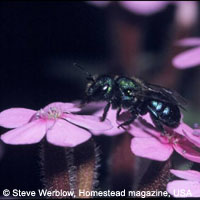Pollinators key to one third of global crop production
One third of global crop production comes from crops that depend on pollinators such as bees, birds and bats, according to new research. The pollination of food crops is widely recognised to be a key ecosystem service, but until now the extent of our reliance on animal pollination at the global scale has not been evaluated. Now an international research team has carried out an extensive review of scientific studies from 200 countries into 115 of the leading global crops. The study, which was partly funded by the EU's Sixth Framework Programme, is published in the Proceedings of the Royal Society B: Biological Sciences. 'There's a widely stated phrase in agriculture that you can thank a pollinator for one out of three bites of food you eat,' said Professor Claire Kremen of the University of California and one of the authors of the study. 'However, it wasn't clear where that calculation came from, so we set out to do a more thorough and reproducible estimate, and we wanted to look at the impact on a global scale.' The researchers found that of the 115 crops studied, 87 were dependent on animal pollination, while 28 were not. Of the 87 pollination-dependent crops, 13 rely entirely on animal pollination, 30 are greatly dependent and 27 are moderately dependent. Looking at production volumes reveals that 60% of global production comes from crops that do not rely on animal pollination. These are mainly staple crops such as wheat, corn and rice. A total of 35% of global crop production comes from crops which do rely on animal pollination. These include many fruit crops that provide macro- and micronutrients which are essential to a healthy diet. 'Our diet would be greatly impoverished, both nutritionally and culturally, if pollination services further decline,' the researchers write. Habitat loss and intensive farming practices are impacting negatively on populations of honey bees, particularly wild bees. 'We've replaced pollination services formerly provided by diverse groups of wild bees with domesticated honey bees,' explained Prof Kremen. 'The problem is, if we don't protect the wild pollinators, we don't have a backup plan.' In some parts of the world, the loss of natural pollinators has already lead to the implementation of extreme measures by the agricultural sector, as lead author Alexandra-Maria Klein of the University of Göttingen explained. 'Passion fruits in Brazil are hand-pollinated through expensive day-labourers as the natural pollinators, carpenter bees, are hardly available because of high insecticide use in the agricultural fields and the destruction of the natural habitats,' she said. In the paper, the researchers outline landscape management practices which could help to boost the numbers of pollinators. These include providing food and nesting sites for the bees by allowing weeds and native plants to grow in areas bordering the crops, and avoiding the use of broad-spectrum insecticides, particularly those which can contaminate nectar and pollen. They suggest that the financial burden of implementing these measures could be alleviated through agri-environment schemes. These funds are available in both Europe and the US for farmers who apply management strategies to increase biodiversity on their land. The scientists also call for more research into crop pollination, especially regarding the role of non-insects such as birds, bats and other vertebrates. 'We urgently need more research in crop pollination along with better coordination of the research efforts at the community level in different producing areas to help sustain production of the diverse crops that nourish humanity,' the researchers conclude.
Countries
Australia, Germany, France, United States



